Over the next several weeks, let’s spend time planning for actual things that can be done to ensure access to books and facts via democratic institutions like public libraries and public schools remains a right for all. No, you won’t find “go buy all of the books and hold on to them so you can distribute them when things fall apart” here. That current trend is obnoxious and ignorant at best and about making yourself a hero, rather than working to shore up institutions that already exist to support everyone within a community. It plays entirely into the ethos of the far right, rather than resists it.
Public libraries have been under attack for several years, as have the people working within them. We know that what happens in public schools makes its way to the public libraries, often by the very same people wrecking hell upon those schools.
Here are some of the things that public libraries, as well as public school libraries where applicable, should be considering right now to prepare for the new administration. There are fewer than two months—and honestly, about one month with the holidays—to shore up your institutions to make them as strong and solid for the community as possible.
As always, some of these things may be more managerial-level actions, rather than things the average library worker can do. But also as always, it is the average library worker who can advocate and champion these changes from the ground floor. You live and work them in a different way and speaking up matters. If it’s never been your style, this may be a good opportunity to strengthen that group of muscles.
Update Your Trustee Descriptions
Several states will be holding spring elections that will impact public libraries and public school boards. When was the last time your description of the duties of a trustee was updated?
Check out this simple and powerful description of a public library trustee’s duties from the Lisle Library District (IL). Especially in states where anti-book ban bills have become law—Vermont, New Jersey, Illinois, Minnesota, California, Colorado, and Washington—putting in ink that one of the principles that public library trustees uphold is the freedom to read and to champion intellectual freedom sends a strong statement.
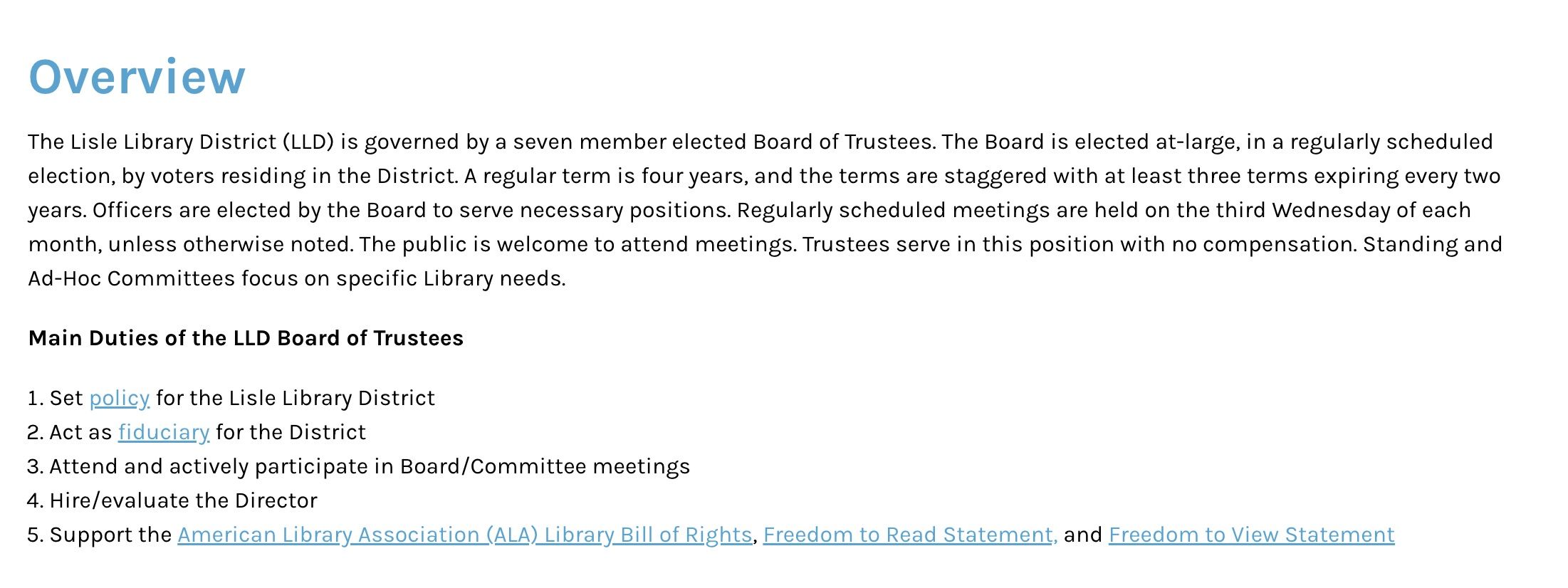
Here’s another great example, this time from La Grange Public Library, also in Illinois. This is from their trustee handbook:
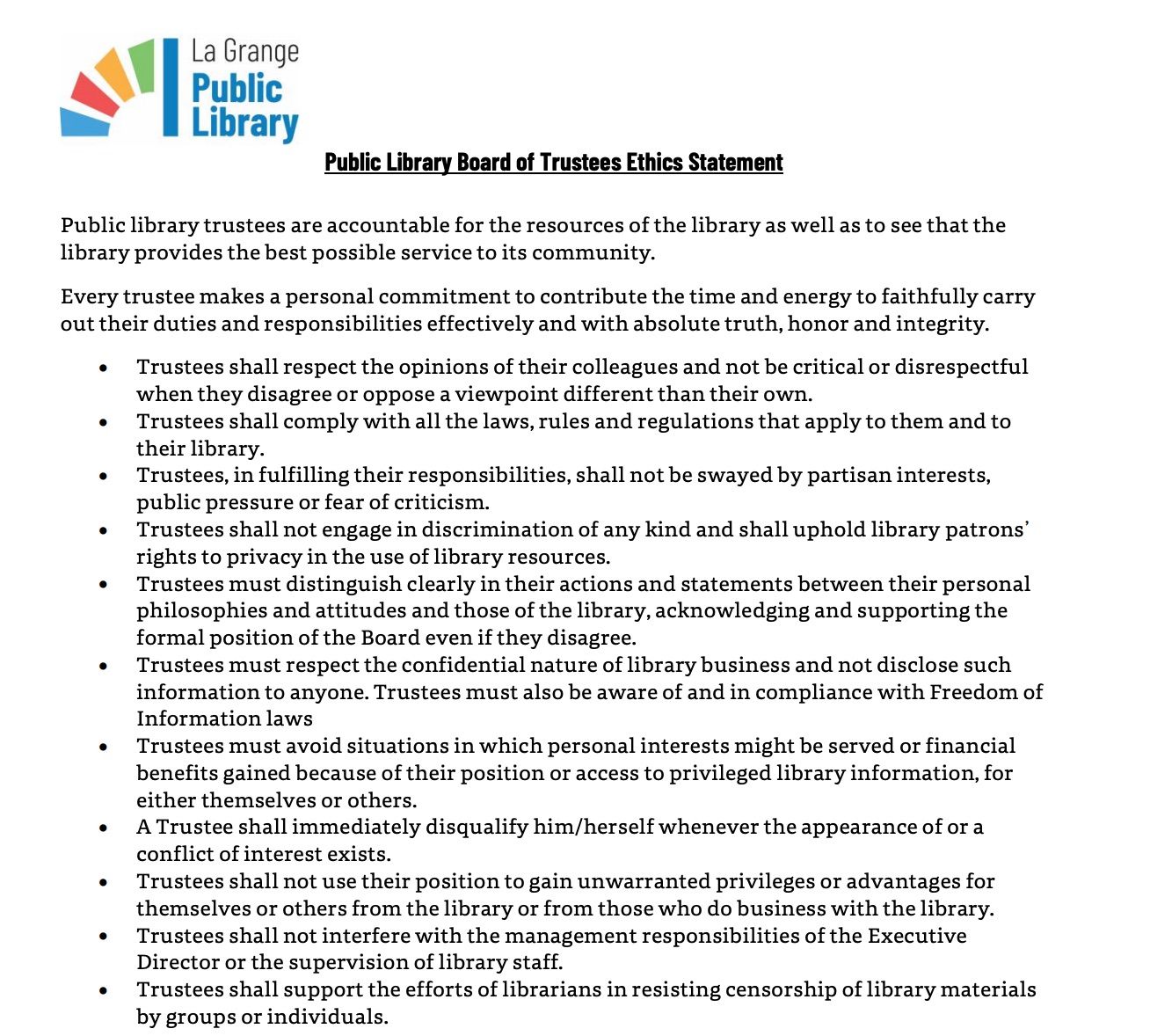
That last bullet point could be bolded and underlined: trustees are there to support the expertise and knowledge of the librarians when it comes to censorship.
Update Your Collection Management Policies
The thing that will protect your library collection the most is your suite of collection development policies. These policies might be one single policy with several sections or several policies that fall under the umbrella of collection management. These include not only the types of materials you acquire but also how you make those decisions—we know that books don’t simply appear on shelves. Explain the review sources you use and why they’re used, as well as explain where and how recommendations from the community and from the professional field come into consideration. Be as clear as possible about the difference between review materials used to make collection decisions and tools used to help in reader advisory. You don’t rely on reviews nor on recommendations from places like BookLooks or RatedBooks, created by Moms For Liberty and Utah Parents United and their cohorts respectively, as those are not professionally vetted sources. You don’t purchase materials based on reviews from Common Sense Media but you may utilize it in helping patrons find materials. It is annoying to get this granular, but that granularity is crucial. Most people don’t know how libraries select material.
Your collection management policies should also include the sections you have within your library (children’s, teen, adult, audiobooks, DVDs and video games, etc). Note these are not sections limited to any particular age group—unless you have policies such as no grownups sitting in the teen area during after school hours in order to have enough space for teens to hang out—but are created in this way to help make finding material easier for all. Name and demonstrate a commitment to inclusivity in those policies as well.
Earlier this year, I recommended some other considerations for collection development. Among them are where and how you might use stickers on your books in the collection and the intent behind their use/non-use; where, why, and how you create book displays and/or reader advisory materials like book lists; and the full, transparent guide to what happens during a book challenge. The more you share here the better. Let your patrons know how many hundreds or thousands of dollars a book challenge can cost and why.
Also crucial in your collection management policy is, of course, where and how people can challenge material. It is their First Amendment Right to petition, and when utilized in good faith, the conversations those challenges can bring up strengthen the relationship between a patron and their library. We have seen few, if any, good faith challenges in the last several years.
The challenge form needs to go beyond what ALA’s template offers. That’s a great starting point, but it provides too much opportunity for bad faith challenges. What happens, for example, if a patron doesn’t actually answer the questions on the form? What happens if they don’t sign it? What happens if their responses are simply cut and paste “proof” of the books being naughty from sites like BookLooks or RatedBooks? These are all things to have right in that collection management policy. If they don’t sign the form, then the book doesn’t go through the process. If their “proof” is copy/pasted and doesn’t answer the questions, then the book doesn’t go through the process.
Lay out the timeline for challenges, who or what bodies are where those challenging materials can go for follow-up, and set limits on how many items one person can challenge at a time. Note, too, how long a decision lasts for any given challenge. If a book is kept on the shelf, can it be challenged again in the same calendar year? In two years? This one might be worth thinking about in terms of how long a board of trustees completely overturns in your library.
One model for a collection management policy is that at Irving Public Library in Texas from 2023. Irving Public Library has long dealt with book challenges from a small, vocal group in town. The library has not banned books during these challenges, and they have continuously updated and strengthened their policy in response to these experiences. It showed.
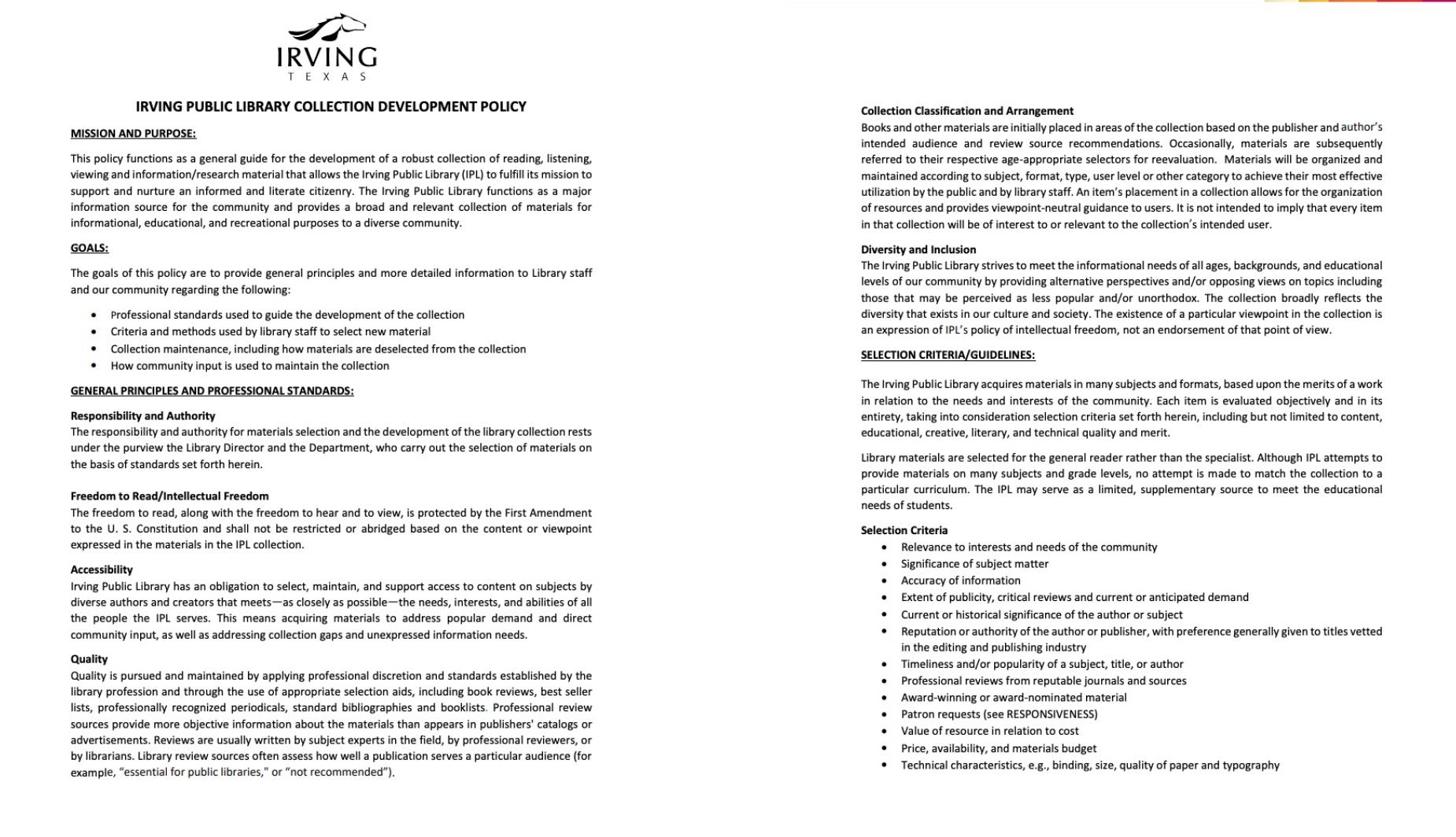
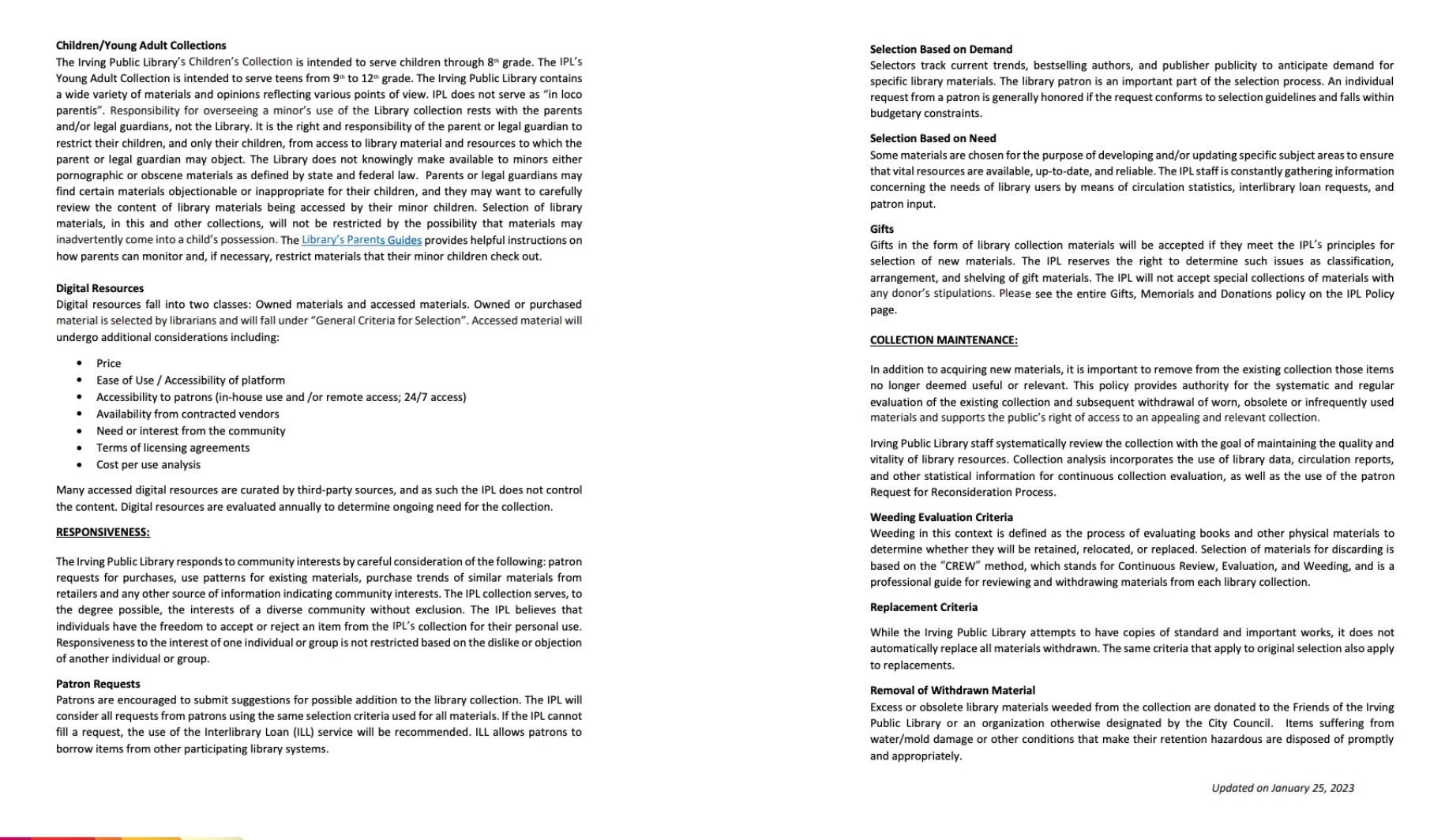
Unfortunately, Irving Public Library made a change in their 2024 iteration of their collection management policy. Now, the library has taken it upon themselves to determine whether or not certain materials in the collection are age-inappropriate; they’ve explicitly baked book censorship into the duties of their library workers and collection policy. Notice the changes here:
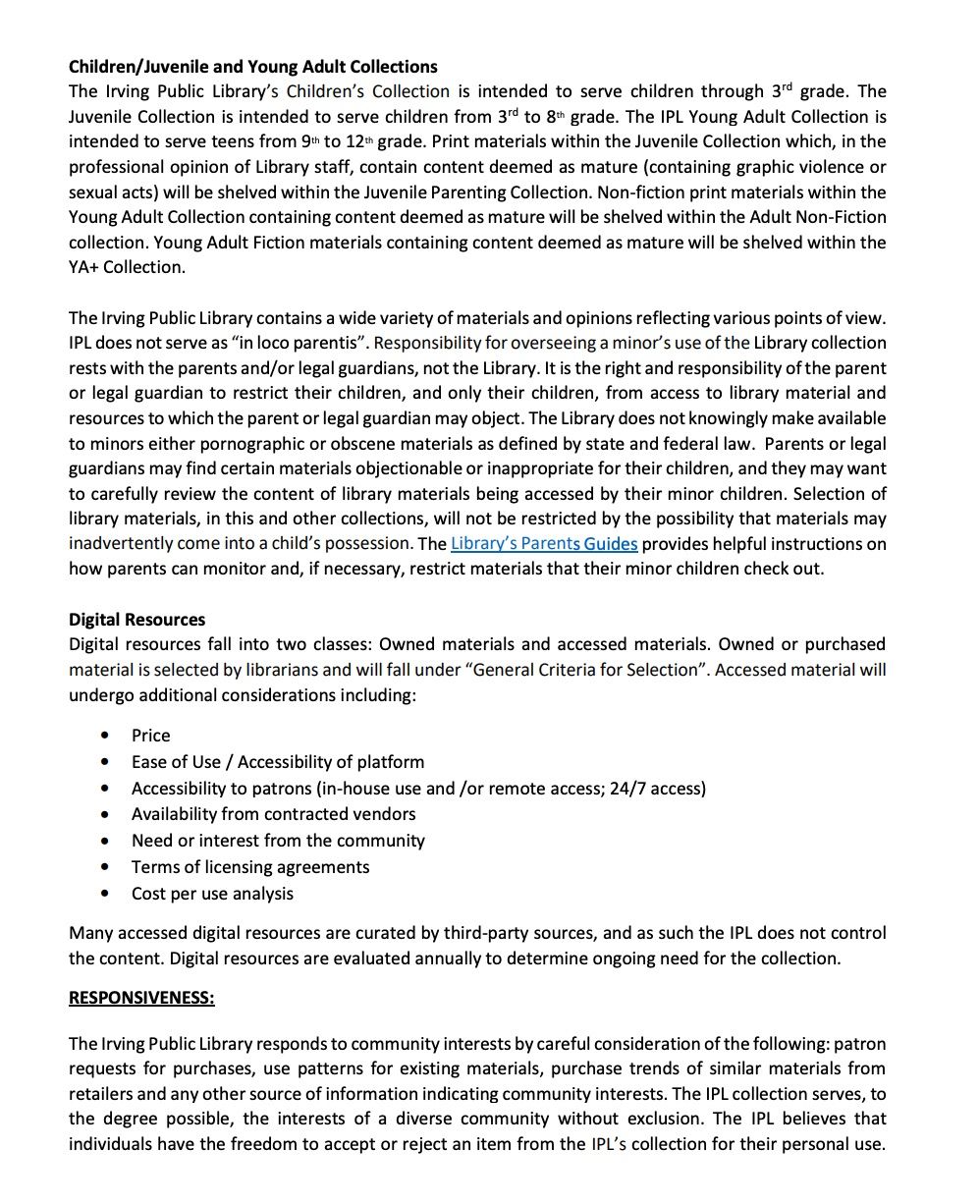
The liability here is high and should be something the library and board reconsider. What happens if a book that Patriot Mobile thinks contains “sexual acts” isn’t shelved in the area as designated on the shelf?
The library just put the onus on the library worker.
In looking for a strong example of a challenge policy, look no further than the just-updated policy from Six Mile Regional Library District (Illinois). Passed in August 2024, the library decided to change the entire language around books challenged. No longer do patrons file a challenge. They submit a statement of concern. This tiny shift in language is anything but. It better captures and articulates what’s at stake here. The book isn’t being challenged as a whole; a patron is bringing a string of concerns with them, and those concerns may warrant a formal challenge but often, those concerns are but personal or political preferences.
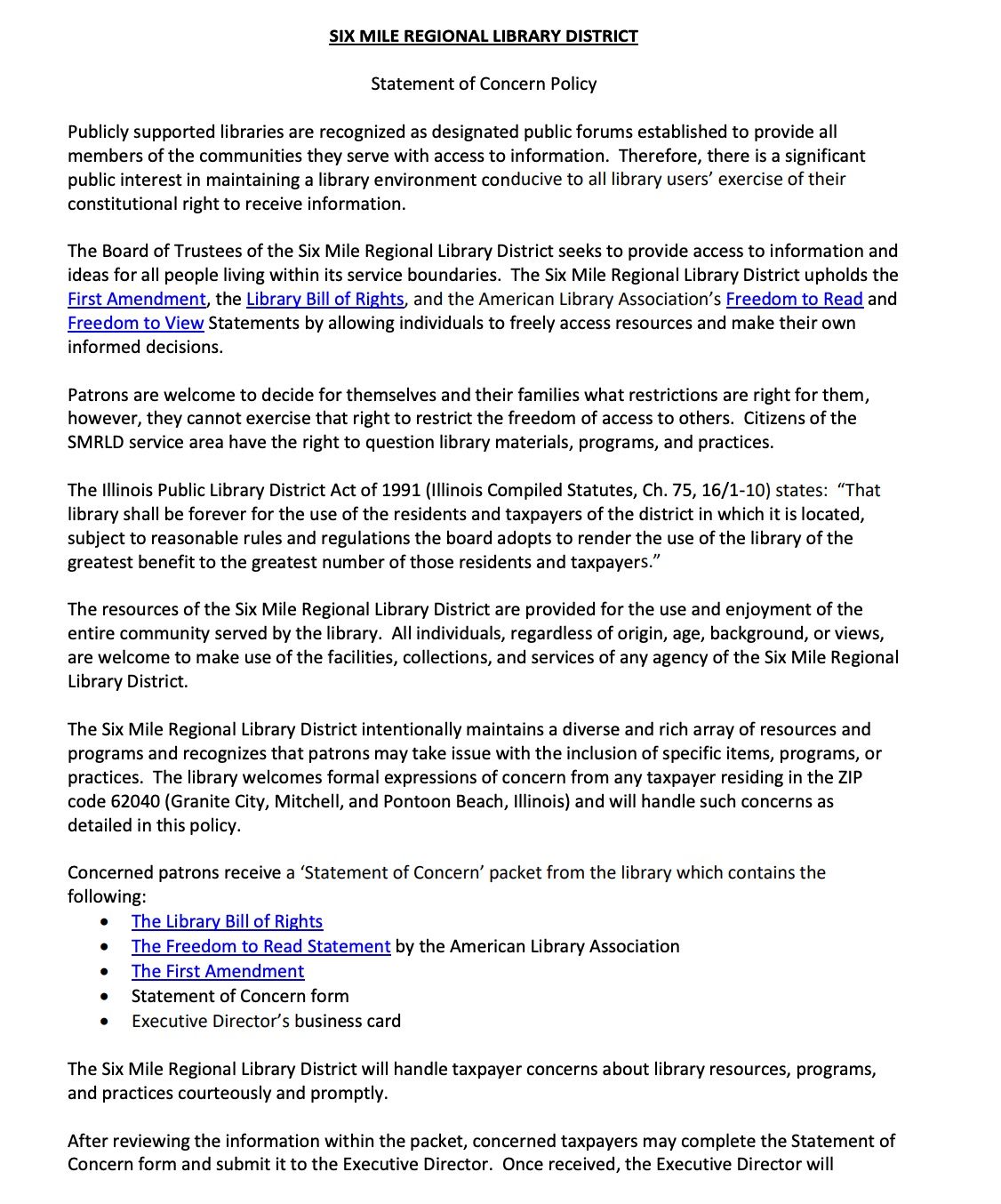
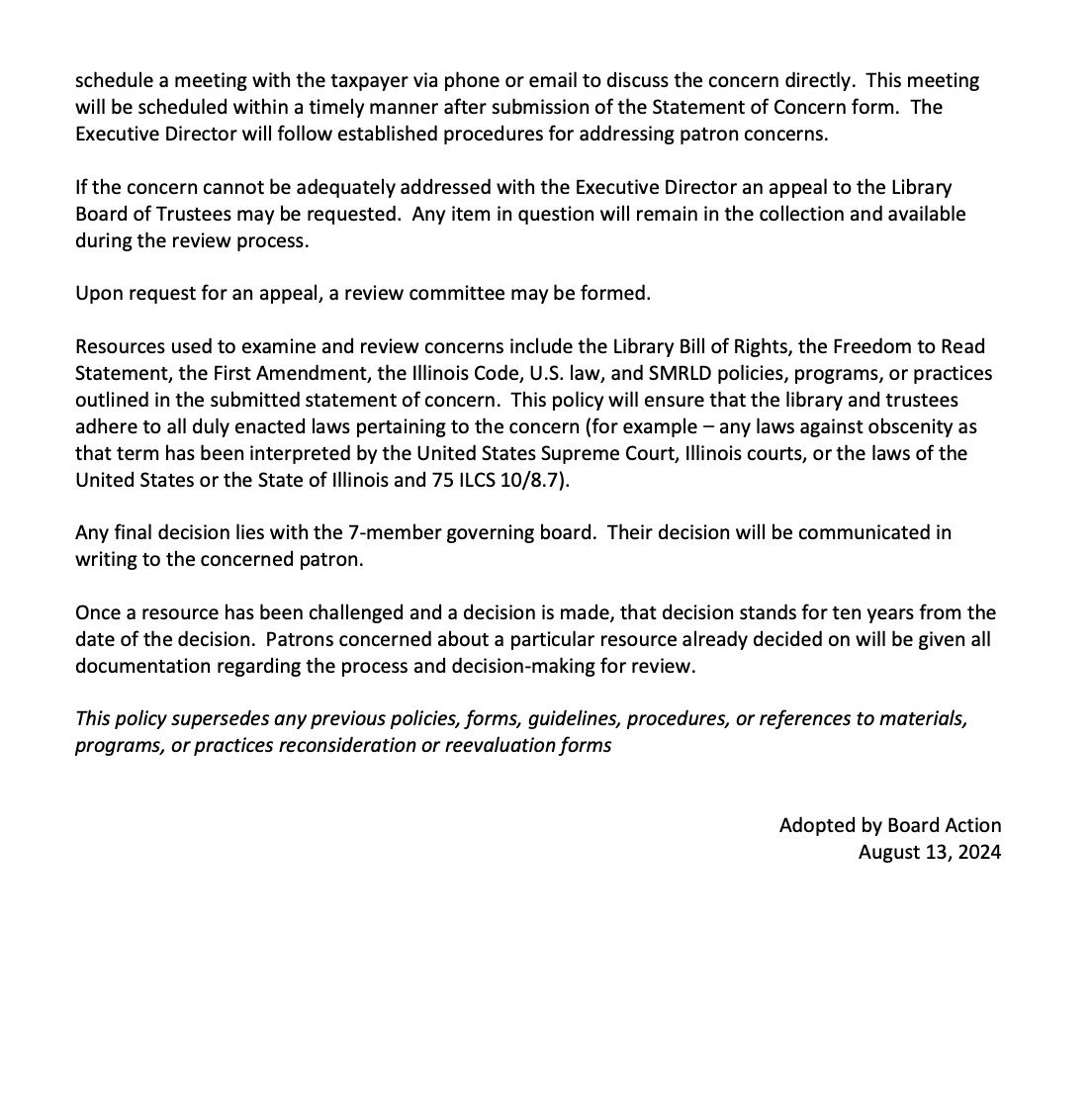
Finally, make it clear what weeding is, how your library engages in it, and how it is part of the professional scope and expertise of a librarian. You may even wish to note that decisions may be made based on knowledge learned about a creator, about cruel depictions of groups of people, outdated material, and material deemed to be part of mis- and dis- information. That’s within the CREW/MUSTIE guidelines.
Be Explicit In Your Commitment to Factual, Data-Backed and Informed Information
Many librarians are likely familiar with what Project 2025 will mean for them. But most probably are not aware that one of the first acts the new president plans to undertake is to ban the terms and ideas of mis- and dis- information. Yes, indeed, the two very things that helped usher in this new regime will be outlawed.
In a policy agenda posted to Trump’s website in December 2022, he shared the following:
FIRST, within hours of my inauguration, I will sign an executive order banning any federal department or agency from colluding with any organization, business, or person, to censor, limit, categorize, or impede the lawful speech of American citizens. I will then ban federal money from being used to label domestic speech as “mis-” or “dis-information”. And I will begin the process of identifying and firing every federal bureaucrat who has engaged in domestic censorship—directly or indirectly—whether they are the Department of Homeland Security, the Department of Health and Human Services, the FBI, the DOJ, no matter who they are.
There are several more bullet points that explicitly protect businesses like X from having to moderate speech following, as well as this:
FOURTH, we need to break up the entire toxic censorship industry that has arisen under the false guise of tackling so-called “mis-” and “dis-information.” The federal government should immediately stop funding all non-profits and academic programs that support this authoritarian project. If any U.S. university is discovered to have engaged in censorship activities or election interferences in the past—such as flagging social media content for removal [and] blacklisting—those universities should lose federal research dollars and federal student loan support for a period of five years, and maybe more. We should also enact new laws laying out clear criminal penalties for federal bureaucrats who partner with private entities to do an end-run around the Constitution and deprive Americans of their First, Fourth, and Fifth Amendment rights. In other words, deprive them of their vote.
Reread that. Engaging in anything related to mis- or dis- information, including but not limited to teaching how to navigate those issues and even associating with private institutions that do these things may lead to losing your democratic right to vote. Remember, “you won’t have to vote anymore” because you won’t be allowed to.
What this means for libraries and school is not only dangerous, it’s damaging to the fundamental purpose of either.
It’s time to double down on the important role libraries play in illuminating and upholding truth and fact. Put this into your collection policies, of course, but it would be beyond worthwhile to have an entire portion of your library’s broader policies—indeed, perhaps even a formal proclamation made before the library/school board and local city/county councils—that the institution is committed to information literacy and committed to presenting the most accurate information possible in every domain. Why not put right in your policies what the words “mis-” and “dis-” information mean and do so in the context of the kinds of materials the library collects?
For example: there are hundreds of books published that spread harmful lies about vaccines. Your library will never collection those because it is blatant disinformation and intentionally causes harm. Your library may, however, purchase memoirs or works of punditry whose authors are vaccine skeptics and who have engaged in the spread of such disinformation, but therein lies the difference, such as Robert F. Kennedy. The first parades as fact; the second, opinion.
Consider where and how mis- and dis- information play into the role of providing reference services, too. Where does a library worker help someone navigate these landmines with their expertise and where does the library worker simply provide the material and not engage in the individual’s intentional attempt to harm?
Short Up Staff Protections
What happens to your staff if they’re harassed by a patron? What happens to your queer librarians or librarians of color in an extreme crisis, either happening in your community or on the national level? It’s time to put into policy where and how they are supported.
To say you support inclusivity isn’t enough. To say you support the mental well-being of staff isn’t enough. It’s time to show it through policy and through action.
This means that you may need to stop thinking about the way things have always been and that “it’s never been a problem before,” and instead, consider all of the ways that mentality has done immense harm to people and you never heard that because they did not trust you with that information.
Open up clear lines of communication here, and build policies with the whole staff involved. Do you create something like a parachute policy where, if things get difficult for a staff member, they can go to management and ask to step away from the desk or office for a few hours? Can they work from home on extremely tough days? Find ways to accommodate everyone in your office because, as we know, the curb-cut effect is real—those accommodations you think may only benefit one person or group have a far larger, more profound effect.
If there’s anything we’ve learned throughout the barrage of book censorship and library attacks since 2021, it’s that the most important most vulnerable part of the library is its people. Protect them.
Without them, libraries are nothing.
Allow People to Advocate For You
One of the smartest things you can do is something that is pretty easy: let people advocate on your behalf. Yes, it is crucial you do your own self-advocacy because expecting others to do it for you isn’t going to work. But there is a difference between expecting people to advocate for you and letting them do so.
Do people in your community know how they can talk about how awesome the library is? Chances are, they don’t. Even power users may have no idea you have a board that wants to hear from them, let alone do they have any idea other places they can share a kudos.
Wood Library in Canandaigua, New York, makes this so easy.

Right on the library’s homepage is a link that reads “support.” Beneath it is another drop-down for how to advocate for the library. When you click through those links, the work is done for you. Want to write a letter to legislators? Click the link and you’ll be sent to where you can do that. Want to write a letter to a local paper? They include all of the information you need to do that. Want to share your stories of the library? You can do it right there.
This is so easy and more, it’s visible. This lets people advocate for you because, much as we want even our best users to care enough to Google, they’re busy, they forget, or they simply won’t.
But if they’re on the library website and can support you from there, you increase the possibility.
There are dozens more arenas worth considering in this period of time before the new administration takes over. Use the time to find anywhere you can strengthen your role in the community as a paragon of service, knowledge, and commitment to truth, as well as where you can ensure that the very democratic institution within which you work will survive the blows coming its way.
We’ve had four years of seeing this play out already. Burying your head in the sand any further will only serve to do deeper, longer lasting damage. To think that if war were to erupt that the library would be a safe haven is to purposefully and blatantly choose to ignore that libraries and public schools are targeted on purpose.
We know better and we must do better.
Book Censorship News: November 22, 2024
Big thanks to Erica and Danika for their tremendous work covering censorship news the last few weeks. I will not be going back to catch every story since, but I will be including some of the stories not covered last week below.
- Rutherford County Schools (TN) dropped a list of 150 books that need to be pulled from schools immediately.
- The list of 400 books banned in Wilson County Schools (TN) was sent to Clarksville-Montgomery County Schools, also in Tennessee, and it’s making staff wonder if that’s their new banned books list, despite claims it isn’t.
- Katy Independent School District (TX) added 14 new books to its banned list, bringing the total to over 30 titles that have been banned in the district since August.
- The book challenge nonsense in Crawford County Library System (AR) is already costing nearly HALF A MILLION DOLLARS. The county is threatening to defund the library.
- Remember York County Library (SC)? Two board members have left. The two who left were pro-library, anti-censorship members.
- A group of homeschool parents complained about Heartstopper being available at the Bellaire Public Library (MI). The book will not be banned.
- While we’re in Michigan, there are two bills in the state that aim to make it against the law to ban books.
- Assassination Classroom has been banned in Horry County Schools (SC). One parent complained is all.
- Decatur County Community School Board (IN) listened to parents cry about their AP students being forced to read a “pornographic” book in the college-level course. The book is Blindness by Jose Saramago. From another story: “Local resident Joshua Smith spoke on behalf of his brother Adam Smith and niece, a junior at SDHS. Smith said his brother found his daughter [Smith’s niece and SDHS student] crying in her bedroom on the evening of Sept. 15. When he asked what was wrong, she purportedly handed him the book Blindness. The following day, Adam reportedly asked that his daughter not read ‘porn’ at school and asked that she be removed from the class or he would pull her from the school. Smith said his brother spoke with the school’s secretary, principal, and the class teacher.” Maybe she wasn’t ready to be in a college-level course?
- The state of Iowa is finalizing their new book banning rule statewide.
- The Clark County School Board (NV) has updated their book review policies to ensure books remain on shelves during a challenge and that the process is spearheaded by actual professionals. What a marvel!
- Conway School District (AR) is listening to a right-winger complain about two more books he believes should be banned in the district. You’ll be familiar with these titles since they’re favorites of the moral panickers.
- “Parents in the Ravena area are expressing outrage after a nonfiction book titled All About Penises was spotted near the children’s section at the RCS Community Library [NY]. The book, which parents say was placed within view of young children, has since been removed, but not before sparking a social media firestorm and raising concerns about appropriateness.” It’s a children’s book, by the way. Some kids have a penis. Parents who are so uncomfortable about this tell on themselves.
- Redondo Unified School District (CA) are being fleeced by the book crisis actors who are claiming kids shouldn’t have access to books like Heartstopper and that teachers should make available to parents every book they ever consider having in their classrooms. Good grief.
- Sargent Central Schools (ND) debated whether or not to remove the Heartstopper series from shelves. Will you be shocked to hear that kids wanted the book that was written for them to be available? The books will remain available.
- The St. Joseph School District’s Board of Education (MO) will keep Looking For Alaska on shelves.
- At the most recent Centralia School Board (WA), members heard from young people who could articulate why they might not choose to read The Poet X but that it wasn’t being forced upon them…while community “adults” played the “pornography” story out about how the book is inappropriate.
- The Florida government is continuing to try to argue that book removals in public schools (and public libraries) are “government speech” and, therefore, not a First Amendment-related issue.
- Remember when county commissioners tried to shut down Samuels Public Library (VA) last year over a handful of complaints from one church group? They’re trying to do it again, but this time, they’re trying to create a newly appointed board to make decisions for the library.
- I’m paywalled from this story, but at least one book celebrating LGBTQ+ identity has been pulled from Germantown, Wisconsin, schools. This is in addition to posters celebrating queer heroes through history being pulled.
- Keep an eye on Arkansas in the coming legislative year. One Democratic State Representative wants to work to end book bans in the state.
- The Warren County Public Library Commission (NJ) wants to implement Moms For Liberty’s ramshackle “review” site BookLooks into the professional library selection process.
- 10 books in the Huntsville Public Library (AL) have been relocated following complaints from book ban crisis actors.
- The Absolutely True Diary of a Part-Time Indian was removed after being used for several years in 12th-grade curriculum at Waterloo Public Schools (IL) after some complaints on Facebook. If ever a sentence were more 2024.
- Two allies of Moms For Liberty earned spots on the Clark County School Board (NV). One ran on the same myths about naughty books pushed by the group.
- The North Carolina pastor who has been making a name for himself trying to ban books in schools made an appearance at the Albuquerque Public Schools (NM) board meeting to stir up nonsense. Note that there were no actual books discussed, per the reporting here, but instead, a lot of nonsense about naughty books and LGBTQ+ books. It’s. All. Made. Up. No one thought to ask why a North Carolina pastor cares about Albuquerque, New Mexico?
